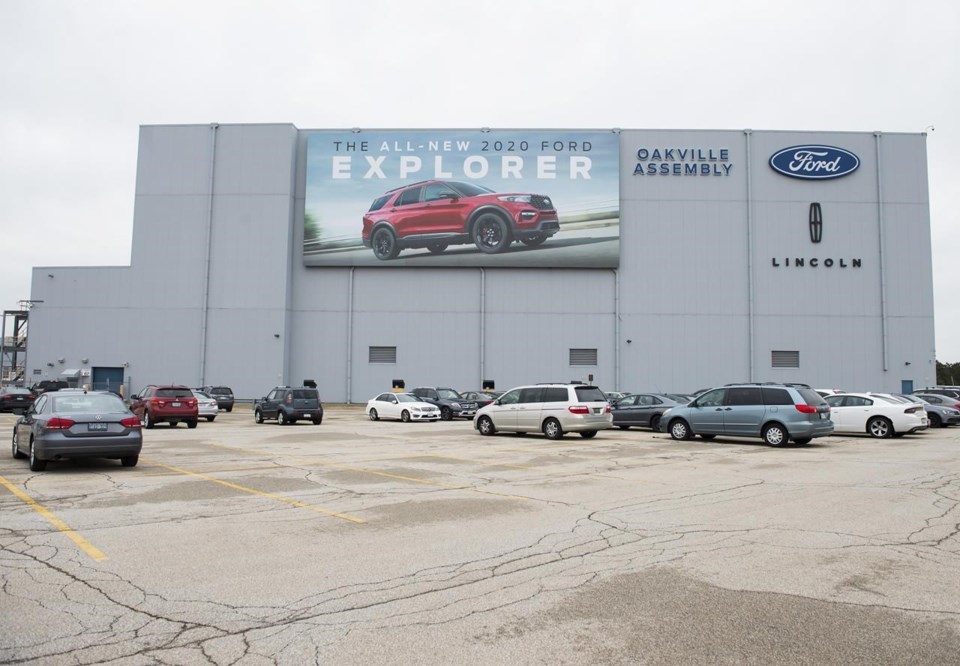TORONTO — Ford Motor Co. is delaying the start of electric vehicle production at its Oakville, Ont. plant by two years, at a time when growth in the EV market is falling short of the automobile industry's ambitions.
The U.S. automaker had planned to start production at the Canadian plant, which employs 2,700 workers,in 2025. On Thursday it said it was pushing that back to 2027.
Ford announced plans last year to spend $1.8 billion to transform its Oakville assembly plant into a hub for electric vehicle manufacturing, including vehicle and battery pack assembly, as it transitions away from combustion engines.
Ford said in its release the delay will give the consumer market more time to develop and allow for further development of EV battery technology.
While the automaker's plan to overhaul the plant and equip it with tools to produce EVs beginning this quarter will continue as planned, the production of the new family-sized electric vehicles at the factory won't start until 2027. That means production workers will be out of a job for significantly longer than expected.
Sam Fiorani, vice-president of global vehicle forecasting and AutoForecast Solutions LLC, says Ford has realized where the market is at the moment.
"Acceptance of EVs is not there to the level that they had planned," said Fiorani in an interview. "They've pushed some investments of EVs back a bit so that they can be prepared when the demand shows up."
Fiorani said Ford is not the first to pause or delay the production of EVs and won't be the last.
"Everybody should have seen it coming," he said. "The initial adopters for EVs are tech-savvy people or green buyers and they're willing to pay a little extra to have an EV to be first on their block."
Most other drivers need a little more convincing to move away from combustion engines, he said, adding that all their questions about places to charge, adequate range and relevant technology need to be answered before they buy.
"It will take time for everyday drivers to warm up to an EV," Fiorani said.
Sales for battery-powered electric vehicles in Canada have seen a consistent uptick since 2017 — outpacing overall vehicle sales growth — but the rate of adoption has fluctuated, according to Statistics Canada.
Some employees will remain on site during the plant transformation but there will be layoffs, Ford spokesman Said Deep said.
He noted that employees are eligible for income security benefits for a period that varies with seniority levels.
The company said it will work with Unifor, which represents 3,200 workers at the plant, to mitigate the impact the delay will have on its workforce.
Unifor said it wants Ford to consider all possible options to lessen the negative effects on workers from the "substantial delay" in the EV production launch at the Oakville plant.
The union's national president, Lana Payne, said she was extremely disappointed by the decision.
Payne said in an interview that she understands the electric vehicle transition is not easy, "but none of that changes the reality of what thousands of workers are facing today and that is a lot of uncertainty and a delayed production to electric vehicles by a number of years."
She added the union is doing everything it can to "push the company to live up to its promises to our members and to the commitments that have been made to have a robust vehicle production facility at Oakville that includes the building of electric vehicles."
In its most recent contract agreement from 2023, Unifor secured an up to 70 per cent income security benefit rate for Oakville plant workers during the planned eight-month retooling.
The union is now looking to extend that financial support.
"The second demand will be: Are there other possible opportunities here to be able to lessen the impact of this decision on our members and their families?" Payne said. "We cannot leave any stone unturned."
Ford president and CEO Jim Farley said the delay would be a benefit in the long run.
"We value our Canadian teammates and appreciate that this delay will have an impact on this excellent team," Ford president and CEO Jim Farley said in a statement.
"We are fully committed to manufacturing in Canada and believe this decision will help us build a profitably growing business for the long term."
Ford has said the planned changes at the site include a new battery plant where workers will assemble parts produced at its U.S. operations into battery packs that will then be installed in vehicles assembled on-site.
The company's spending plans were first announced in 2020 as part of negotiations with Unifor, during which time workers wanted to secure long-term production commitments. The Detroit Three automakers eventually agreed to invest in their Canadian operations, in concert with spending agreements with the Ontario and federal governments.
The two governments agreed to provide $295 million each in funding to secure the Ford investment.
Ontario Premier Doug Ford called the delay "disappointing" at a news conference in northern Ontario.
He added, "I understand that Ford is going to take care of the Unifor members. That's No. 1. It's an absolute priority."
The company needs to try and retool "as quickly as possible," said the premier.
Asked what the automaker's delay meant for his government's plan to draw manufacturing capacity to Canada, Prime Minister Justin Trudeau said during a press conference in Winnipeg that companies make decisions that make sense to them.
He noted that his government is seeing a continued adoption of EVs by Canadians and progress toward a manufacturing chain that runs from mines to battery assembly and auto assembly to after-market recycling efforts.
This report by The Canadian Press was first published April 4, 2024.
Ritika Dubey, The Canadian Press


